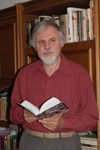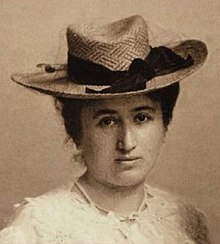By Alex Gordon


HAIFA, Israel –The Rosa Luxemburg Foundation website says about her: “A freedom-loving woman in a world in which women were not free; an intellectual in a world in which only men were considered educated and intelligent; a political leader in a world in which men ruled; a socialist in a world of militant capitalism; free of cuisine and religion in a world of petty bourgeois values; a Jewish immigrant in a world in which antisemitism and nationalism prevailed; alone in the struggle against war in a crowd of millions of fans of military parades and gun salvos.” According to researcher Rolf Schneider, “Fate deprived her three times: as a woman in a male-dominated society, as a Jewess in an antisemitic environment, and as a cripple. She was too short, with a limp, probably a birth defect. Her head was too big for her small body. All these physical disadvantages she tried to hide, wearing long spacious dresses and hats with wide brim.”
According to Trotsky’s recollections, Rosa was “Small in stature and frail in build, but she towered on the rostrum of the congress as the embodied thought of the proletarian revolution. […] Rosa Luxemburg surpassed not only her opponents but also her comrades-in-arms by a full head. She was a woman of genius.” For her demands for power for the workers, the German press began to refer to Luxemburg as the Bloody Rose.
Rosa Luxemburg was born on March 5, 1871 in Poland. She was the fifth child of a bourgeois Jewish family. The family moved to Warsaw when she was three years old. On Catholic Christmas Day 1881, when Rosa was ten years old, a pogrom inspired by the Russian authorities began in Warsaw. Only on the third day was the pogrom stopped by the troops (about fifteen hundred Jewish apartments and other premises were vandalized, 24 people were wounded). According to historian Paul Johnson, on her mother’s side, Rosa, like Marx, came from a family of rabbis. Her mother quoted passages from the Torah to her as a child. However, Rosa was indifferent to Judaism and Yiddish culture. Jewish socialist historian Robert Wistrich believed that her heightened sense of social justice and striking mastery of dialectic were passed down to her from generations of rabbis in the family.
Rosa studied brilliantly at the Warsaw Women’s Gymnasium, combining her studies with her membership in a socialist youth circle. Fearing arrest, she moved to Switzerland in 1890 and entered the University of Zurich, first at the Faculty of Natural Sciences, then at the Faculty of Law and Economics. In 1897 she defended her doctoral dissertation on the development of industry in Poland. Her articles were published in reputable socialist publications, and she became known in Europe. She was considered the chief theorist of Social Democracy in the Kingdom of Poland.
After moving to Berlin, in 1899, Rosa Luxemburg joined the German Social Democratic Party and became its leading theorist and activist, the leader of the left wing. At the end of December 1905, with someone else’s passport, she sneaked into revolutionary Warsaw. Three months later she was arrested by the tsarist gendarmes. During the First World War, Rosa Luxemburg declared herself an internationalist and, together with Karl Liebknecht, founded the Spartacus Union, the German Communist Party. On February 18, 1915, after speaking at a rally in Frankfurt, Luxemburg was arrested and imprisoned for anti-war remarks. A year later she was released, but three months later she was arrested again and sentenced to two and a half years in prison. Throughout 1915-1918 she spent a total of three years and four months behind bars. On November 8, 1918, the day before the establishment of the republic in Germany, Luxemburg left her prison cell, returned to Berlin, and resumed her political activities, which continued until her death in January 1919.
The Jewish revolutionary leaders of Germany were alienating themselves from their own people. On February 16, 1917, Rosa Luxemburg wrote from prison a harsh response to a letter from her Jewish friend Matilde Wurm, concerned about the Jewish pogroms: “There is no room in my heart for sympathy for the suffering of these Jews. I feel the same affinity and sympathy for the unfortunate victims on the Potmayo plantations and the blacks in Africa, whose bodies white people play with like a toy ball. […] There is no special place in my heart for the ghetto: I feel at home in the whole world, in any place where there are clouds, birds and human tears.” Luxembourg displaced from consciousness the pogrom experienced as a child. The fear of pogroms was transformed into a fear of belonging to the people being thrashed. She was repelled by the Jewish people and drawn to universal problems.
Like Marx and Lenin, Rosa did not see the danger for all classes in the hegemonic proletariat seizing power in society and ceasing to be workers. She did not recognize the existence of the Jewish question. In her writings, Luxemburg mentions Marx’s antisemitic article on the Jewish Question, but does not analyze it. She is convinced that the nation is not an existing category, but that the only force of historical processes is class. Accordingly, the nation has no problems, only the poor, the proletariat, have problems. She wrote: “For the followers of Marx, as for the working class, the Jewish question as such does not exist.” Red Rose subconsciously denied not so much the Jewish question as the Jewish answer. The internationalization of the Jewish question was the dogmatic belief of Rosa Luxemburg, a doctor of science and theorist of socialism. She did not repeat Marx’s accusations against the Jewish people but ignored their existence. In contrast to what she experienced in Warsaw, she argued, “Jewish pogroms occur in small, remote villages where the revolutionary movement is weak or non-existent.”
But her Jewish and internationalist affiliation was not forgotten: on 15 January 1919, Rosa Luxemburg was murdered by nationalists, soldiers of the Freikorps, some of whom later joined the Nazis.
While in prison, Rosa welcomed the Bolshevik revolution but condemned the violence used by Lenin and Trotsky: “The proletarian revolution does not need terror to realize its goals, it hates killing people and despises such actions.” Bolshevik terror, according to Luxemburg, was “an expression of political weakness”. In 1918, in The Russian Revolution. A Critical Assessment of Weakness, she expressed thoughts close to those affected by the Soviet regime: “With the suppression of free political life throughout the country, life and in the Soviets inevitably falters more and more. Without free elections, without unrestricted freedom of the press and assembly, without the free struggle of opinions, life dies out in all public institutions, becomes only a semblance of life in which only the bureaucracy remains an active element. […] A few dozen energetic and experienced party leaders dominate and rule. Among them only a dozen of the most prominent men really rule, and only a select section of the working class meets from time to time to applaud the speeches of the leaders and unanimously approve the proposed resolutions. Thus, it is a dictatorship of the clique, an undoubted dictatorship, but not of the proletariat, but of a bunch of politicians.” Rosa’s slogan, “Freedom is also freedom for those who think otherwise,” became popular at student demonstrations in East Germany a year before the fall of the Berlin Wall.
Rosa Luxemburg was born in Poland, formerly part of Czarist Russia, and became a Prussian citizen through a fictitious marriage to Gustav Lubeck. Neither Poland, nor Russia, nor Germany, nor her Jewish countrymen evoked any sympathy in Rosa. She had no homeland, she belonged to no nation. Luxemburg distanced herself from Jewry and had a long narcotic dream of saving humanity from capitalism. She theorized on Marxist themes and engaged in revolutionary practice in Germany after its defeat in World War I. Like Lenin, she sought to turn the country’s military defeat into a victory for the “dictatorship of the proletariat,” Jewish American historian Seymour Martin Lipset wrote: “Participation in the socialist and communist movement meant for many Jews a way to escape Jewishness and assimilate into a universal, non-Jewish world.”
Rosa Luxemburg sought to liberate the proletariat without noticing that this liberation was inseparable from the enslavement of other classes. A “dictatorship of the proletariat” inevitably led to a dictatorship. Luxemburg did not want to liberate the Jewish people, she wanted to liberate herself from them, but she unwittingly became one of the destroyers of society, one of the negative symbols of the Jewish people. She did not live to see the “final solution of the Jewish question” in Nazi Germany, nor did she end up in ghettos and death camps. She did not live to see the collapse of communism, nor did she experience the collapse of her ideas and hopes.
*
Alex Gordon is a native of Kiev, Ukraine, and graduate of the Kiev State University and Haifa Technion (Doctor of Science, 1984). Immigrated to Israel in 1979. Full Professor (Emeritus) of Physics in the Faculty of Natural Sciences at the University of Haifa and at Oranim, the Academic College of Education. Author of 8 books and about 500 articles in paper and online, was published in 62 journals in 14 countries in Russian, Hebrew, English and German.